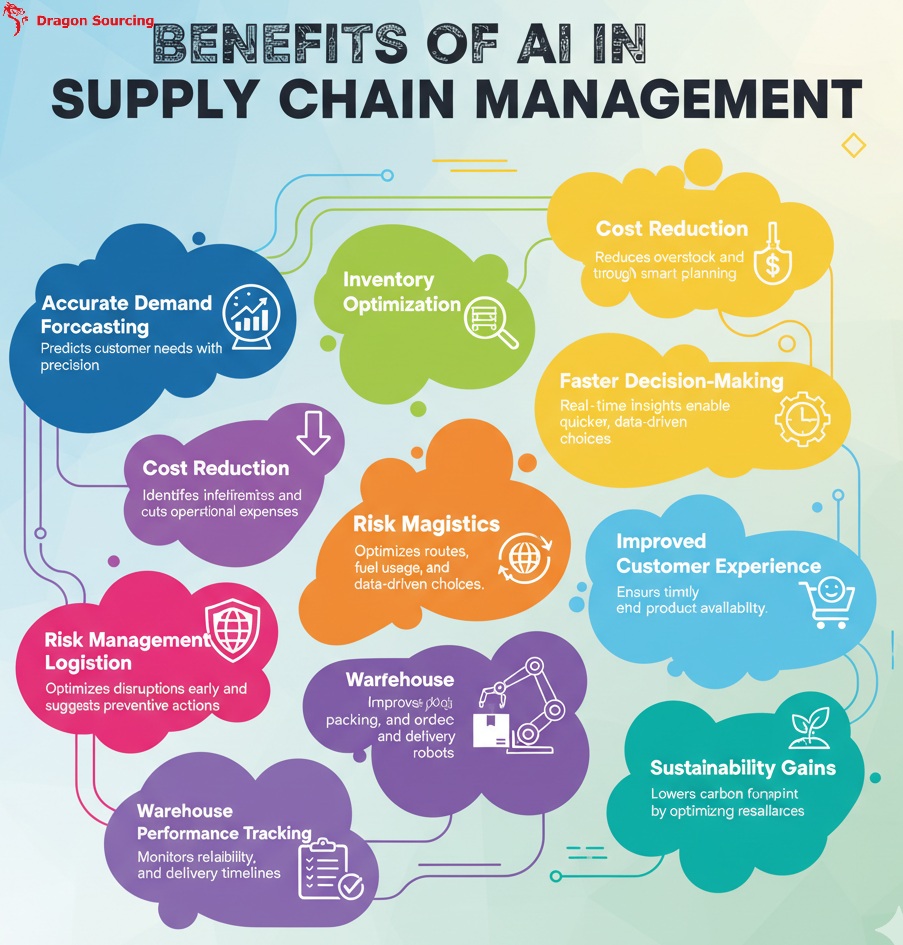
Summary
- AI enhances demand forecasting using data and trends.
- AI optimizes inventory to prevent stockouts and overstock.
- Lowering costs by reducing inefficiencies and automation.
- Going faster, real-time decision-making.
- Enhances logistics with optimized routes and deliveries.
- Build up the risk management by predicting disruptions.
- Warehouse automation for efficiency and accuracy.
- Tracks supplier performance to ensure reliability.
- Improve customer experience with timely service.
- Enhances sustainability by reducing waste and emissions.
Artificial Intelligence (AI) is a driving force behind these changes in the supply chain industry, which is undergoing a massive transformation, and one of the. Global businesses are leveraging AI to optimize their supply chains in growing complexities in logistics, increasing customer expectations, and the need for cost efficiency. AI has revolutionized supply chain management (SCM), ranging from predictive analytics to warehouse automation.
We explore the top 10 benefits of AI in supply chain management and how it helps businesses gain a competitive edge in this article.
Accurate Demand Forecasting
It’s always a challenge to predict customer demand for businesses. Historical data, buying patterns, and external factors like seasonality or economic trends are used by AI to forecast demand with greater accuracy. This helps organizations to maintain the right inventory levels, avoid overproduction, and meet customer needs efficiently.
Inventory Optimization
There are two supply chain nightmares: one is stockouts, and the other is excess inventory. The system, which is AI-driven, analyzes sales patterns, warehouse data, and supply trends to optimize inventory. As a result, companies can reduce wastage, free up working capital, and ensure that products are available when customers need them.
Cost Reduction
AI detects inefficiencies throughout the supply chain, encompassing procurement and logistics. Organizations can reduce costs significantly by this type of streamlining operation. Whether it’s cutting transportation expenses through optimized routing or minimizing labor costs with automation, AI drives measurable savings.
Faster Decision-Making
Traditional decision-making in supply chains typically depends on spreadsheets and manual data analysis, which can be both time-consuming and prone to errors. Usually AI shares real-time insights that enable leaders to make quick, data-driven decisions. This flexibility is essential in a fast-paced business environment where disruptions can occur without warning.
Enhanced Logistics
The logistics systems powered by AI improve delivery accuracy and reduce delays. Machine learning algorithms optimize delivery routes, balance load capacities, and minimize fuel usage. This enhancement not only boosts efficiency but also improves customer satisfaction by guaranteeing timely deliveries.
Risk Management
There are numerous risks, including geopolitical issues, natural disasters, and supplier disruptions in supply chains. AI assists organizations in predicting potential risks by examining large volumes of data from various sources. By predicting potential disruptions early, companies can take preventive measures and build more resilient supply chains.
Warehouse Automation
Warehouse operations have been transformed by robotics and AI-driven automation. Automatic packing, picking, and sorting systems increase speed and accuracy while lowering human errors. These intelligent systems facilitate seamless operations, even during periods of high demand, resulting in enhanced productivity and reduced labor costs.
Supplier Performance Tracking
AI tools detect such supplier data as delivery timelines, pricing, and product quality. This ensures that businesses can evaluate supplier performance in real time and make better sourcing decisions. It also helps in building long-term partnerships with reliable suppliers, reducing supply chain bottlenecks.
Supplier Performance Tracking
Delivery timelines, pricing, and product quality are such supplier data monitored by AI tools. This ensures that businesses can evaluate supplier performance in real time and make better sourcing decisions. It also helps in building long-term partnerships with reliable suppliers, reducing supply chain bottlenecks.
Improved Customer Experience
AI ensures customers’ experience to get what they want when they want it. AI enhances service reliability by enabling accurate demand forecasting and faster logistics. Personalized recommendations, faster delivery, and better availability of products contribute to higher customer satisfaction and loyalty.
Sustainability Gains
AI plays a vital role, with growing pressure on businesses to reduce their environmental footprint, in creating greener supply chains. By optimizing routes, minimizing waste, and improving energy efficiency, AI reduces carbon emissions and promotes sustainable business practices.
Final Thoughts
AI is a strategic necessity for modern supply chains, not just a technological upgrade. AI offers multifaceted benefits, from reducing costs and risks to enhancing customer experience and promoting sustainability, that drive long-term growth. Organizations that enhance AI in their supply chain operations are better equipped to stay competitive in an unpredictable global market.
As supply chains continue to evolve, the integration of AI will move from being a differentiator to a standard practice. The companies that adopt AI today are positioning themselves for efficiency, resilience, and innovation in the future.
Resources
- McKinsey & Company – Artificial Intelligence in Supply Chain Management
https://www.mckinsey.com - Gartner – How AI is Transforming the Supply Chain
https://www.gartner.com - Deloitte Insights – AI in Supply Chain and Logistics
https://www2.deloitte.com - PwC – The Impact of Artificial Intelligence on Supply Chains
https://www.pwc.com - Supply Chain Digital – AI-Powered Supply Chains: Trends and Benefits
https://supplychaindigital.com - World Economic Forum – Shaping the Future of Advanced Manufacturing and Production
https://www.weforum.org - Harvard Business Review – AI in Operations and Supply Chains
https://hbr.org
Author’s Bio:
Pankaj Tuteja
Head of Operations – India
https://www.dragonsourcing.com




